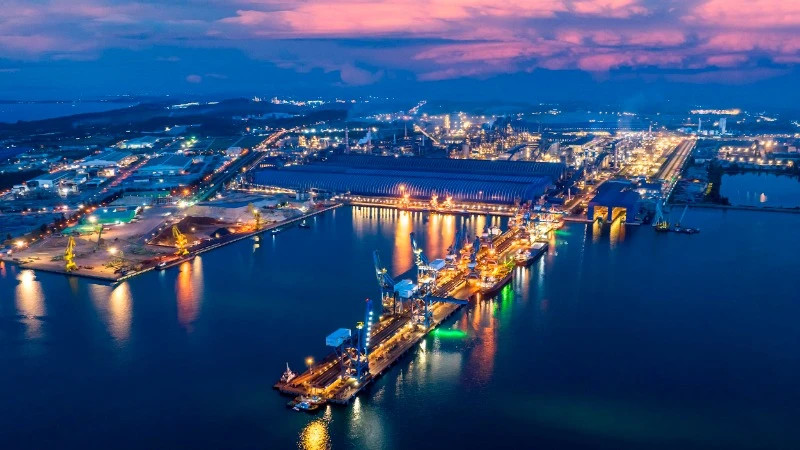In the article “Developing Private Economy – Leverage for Prosperous Vietnam”, Party General Secretary To Lam emphasises that the private sector must be the pioneering force in this new era, successfully driving industrialisation and modernisation, enhancing national competitiveness, contributing around 70% of GDP by 2030, and producing more globally competitive enterprises. The mission and vision of the private economy in this new era have thus been clearly defined.
Recognised but not yet equal
In his overview of the private economy’s role, vision, and development orientation in the new era, Dr Tran Dinh Thien asserted a core truth: the history of human development has proven that the private economy is the foundation of the market economy. In Vietnam, the private sector was officially recognised at the 6th National Party Congress in December 1986 and became a core force in pulling the economy out of crisis and integrating into the global market. Today, it is seen as the most significant driver of economic growth. The Party’s renewed thinking encourages entrepreneurship and breaks longstanding biases against the private sector.
The nearly 40-year journey of Vietnam’s private sector includes early pioneers like Hanh Nguyen, founder of Imex Pan Pacific Group (IPPG), who was instrumental in launching the first international air route from Ho Chi Minh City to Manila in September 1985—a milestone linking Vietnam to a capitalist country.
Today, although IPPG holds exclusive distribution rights for over 100 luxury brands, its retail spaces are scattered, lacking the centralised draw to attract tourists. Meanwhile, prime real estate in major commercial hubs of Hanoi and Ho Chi Minh City remains under state-owned enterprises, unused or underutilised.
“Those who need retail space can’t get it, while those who have it don’t need it,” said Hanh Nguyen. “We’re willing to pay premium rates to build five-star international shopping centres that would attract more tourists, increase their spending, and benefit both businesses and the nation. Private enterprises simply want equal access to state resources to contribute to national prosperity.”
According to Dr Tran Dinh Thien, policy discrimination is a fundamental reason Vietnamese private enterprises struggle to scale. National resources remain concentrated in the state sector, while private enterprises face challenges accessing land, capital, and tax incentives.
Vietnam’s achievement in maintaining high growth and low inflation in recent years may mask the private sector’s difficulties, leading to policies that miss their mark in supporting this crucial segment. Compared to state-owned and foreign-invested enterprises, which enjoy easier access to resources and incentives, the private sector needs more equitable treatment to unleash its full potential.
Engaging in national-scale challenges
As the Hoa Phat Dung Quat 2 integrated steel complex in Quang Ngai Province nears completion by late 2025, it regularly hosts investors and inspection teams seeking to verify Chairman Tran Dinh Long’s commitment to producing high-quality steel for railway tracks and train axles for the North–South high-speed railway project. Since 2017, Hoa Phat has invested 7 billion USD into Dung Quat Economic Zone across two key projects.
The existing Hoa Phat Dung Quat steel complex now employs 17,000 workers, and the upcoming Dung Quat 2 facility will bring Hoa Phat’s total annual steel output to 15 million tonnes, placing it among the world’s top 30 steel producers. The scale and modernity of the complex, spanning nearly 700 ha with an integrated deep-water port, dispels any doubts about Hoa Phat’s capabilities.
Opportunities for private enterprises arise from the Party and Government’s renewed thinking about private economic development. Dr Nguyen Duc Kien, former head of the Prime Minister’s Economic Advisory Group, recalled that when reviving the high-speed railway project, the aim was to allocate as much as possible of the 67 billion USD market to domestic companies—to help them master the technology and create mechanisms for private sector participation.
As a result, companies like Thaco, Hoa Phat, and Deo Ca are now mentioned alongside major state firms like Viettel and Vietnam Railways. Leading construction firms are rushing to prepare for roles in the infrastructure components—everything from foundations to rails—worth around 40 billion USD, 90–95% of which could be handled by domestic contractors.
Yet, challenges remain. Vietnam’s railway industry is still developing, and if bidding requirements insist on prior experience with similar projects, no local contractor would qualify, since this is the country’s first high-speed railway.
For Hoa Phat, Tran Dinh Long’s concern lies in state procurement mechanisms. The company is ready to invest 10 trillion VND to build a rail steel plant but needs demand assurance. Without a government resolution guaranteeing procurement, the specialised steel product has no alternative market.
“This is a major public investment project, and we must give domestic private enterprises a chance to grow and contribute to national development,” said Dr Nguyen Dinh Cung. “Globally, governments create such opportunities for local businesses—we should learn from that. Bottlenecks must be removed and special mechanisms implemented so private firms can be key players in the high-speed railway project.”
From a policy perspective, Dr Le Duy Binh, Director of Economica Vietnam, is optimistic about the Party’s evolving vision for the private sector. Despite existing obstacles, the private sector has driven many breakthroughs and transformed the nation in recent years.
Thaco has realised the dream of a Vietnamese auto industry. Sun Group built Van Don International Airport in just two years. Vingroup developed modern urban areas that improved living standards in major cities. And the current government’s landmark achievement—3,000 km of expressways—owes much to private sector involvement.
The private sector has helped reduce financial pressure on the economy, utilise domestic materials, and lessen dependency on foreign inputs. Previously, private businesses had to “ask” for the government’s trust to be assigned major tasks. Today, the government proactively includes them in tackling national challenges.
















